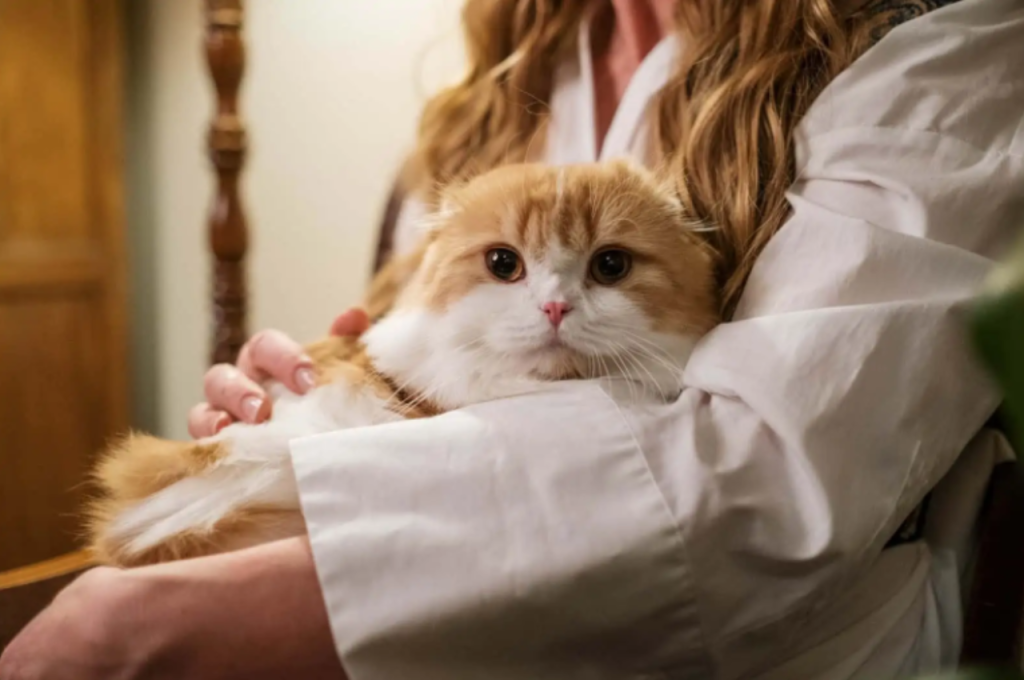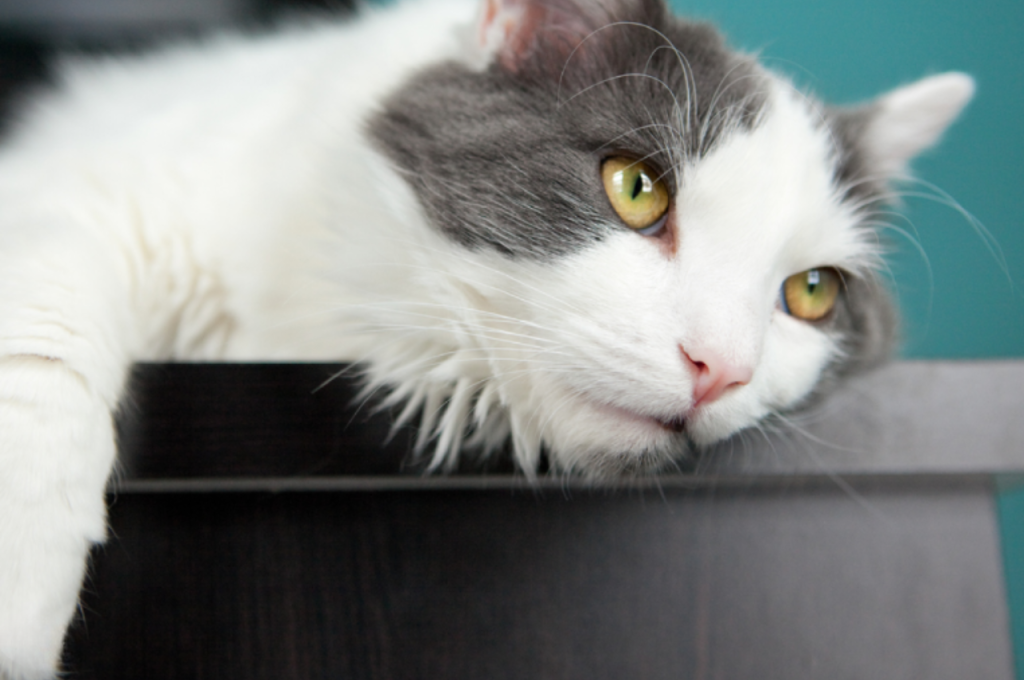Yes, cats can sense and respond to human sadness through their sensitive sense of smell. Cats have an exceptional sense of smell, which enables them to detect subtle changes in a person’s body odor and pheromones when they are feeling sad.
This heightened sense of smell allows cats to pick up on the chemical changes that occur in a person’s body when they are experiencing emotions such as sadness or distress. As a result, cats can often exhibit behaviors such as cuddling, purring, or rubbing against their owners when they sense their sadness.
While cats may not fully comprehend the concept of sadness, their ability to detect and respond to human emotions is a testament to their empathetic nature.
The Sensitive Sense of Cats
Cats possess a remarkable sense of smell, which plays a vital role in how they perceive the world around them.

Exploring Cats’ Superior Olfactory Abilities
Cats have an exceptional sense of smell compared to humans, with nearly 200 million scent receptors in their noses.
Their olfactory abilities are about 14 times more sensitive than that of humans.
How Cats Use Their Sense of Smell in Understanding Emotions
Cats use their keen sense of smell to detect pheromones and other chemical signals to interpret emotions, including sadness.
When their owners are feeling down, cats may pick up on changes in scent and behavior to offer comfort.
Feline Empathy in Action
Can cats smell sadness? As it turns out, our feline friends have a remarkable ability to sense our emotions and offer comfort in times of distress. From Real-life Instances of Cats Comforting Distressed Humans to Research Findings on Cats’ Emotional Responses to Human Feelings, let’s explore how feline empathy is truly in action.
Real-life Instances of Cats Comforting Distressed Humans
Cats have a unique way of connecting with humans on an emotional level, especially when they are feeling down or sad. There are countless heartwarming stories of cats providing solace and support during difficult times. Here are some real-life instances that highlight their extraordinary empathy:
- A grieving widow found comfort in her cat, who incessantly cuddled up next to her and purred, providing a soothing presence during her darkest hours.
- A child with anxiety found solace in their feline companion, who would purr and curl up on their lap whenever they felt overwhelmed, instantly calming their nerves.
- A cat sensed its owner’s emotional turmoil after a distressing breakup, and instead of their usual playful antics, they stayed by their side, nuzzling and offering gentle purrs and headbutts as if to say, “I’m here for you.”
These heartwarming instances demonstrate that cats possess a remarkable ability to detect distress and respond with empathy, offering support and companionship during challenging times.
Research Findings On Cats’ Emotional Responses
Scientific studies have delved into the question of whether cats can truly sense human emotions like sadness. The research findings provide fascinating insights into cats’ emotional responses:
| Research Study | Findings |
| A study conducted at a university | Found that cats can decipher human facial expressions associated with different emotions, including sadness, suggesting their ability to recognize and respond to human feelings. |
| Another study involving pet owners | Revealed that cats tend to spend more time with their owners when they are perturbed or upset, indicating their inclination to offer emotional support. |
| A research project at a renowned animal behavior institute | Demonstrated that cats displayed more affectionate behaviors towards humans who showed signs of distress, reinforcing the notion of their empathetic nature. |
These research findings provide scientific validation to what cat owners have long observed and experienced: that cats possess an innate ability to perceive and respond to human emotions, particularly when it comes to sadness and distress.
The Role of Pheromones
Pheromones play a crucial role in feline communication and behavior. These chemical signals are secreted by various glands throughout a cat’s body and can convey information about territory, mating readiness, and emotional states. Here’s a closer look at the role of pheromones in cats:
Understanding Pheromones and Their Impact On Cat Behavior
Cats rely heavily on their sense of smell to navigate and interpret the world around them. Pheromones, which are chemical signals released by animals, play a crucial role in feline communication and behavior. Understanding the impact of pheromones on cat behavior can provide insight into how they perceive and respond to human emotions.
Cats and Human Pheromones: Emotional Responses
When humans experience emotional situations, they release pheromones that can be detected by cats. Cats have a remarkable ability to pick up on these subtle chemical cues, allowing them to sense changes in their owners’ emotional states. As a result, cats may exhibit different behaviors in response to these pheromones, such as seeking comfort or providing companionship.

Can Cats Sense Sadness?
Can cats sense sadness? It’s a common question among pet owners, and many believe that cats have an uncanny ability to detect human emotions. As our feline friends exhibit fascinating behavior, it’s no surprise that people wonder if they can pick up on feelings like sadness. Let’s dive into the subject to explore whether there’s any truth to this popular belief.
Debunking Myths
First, it’s crucial to debunk some misconceptions about cats’ ability to sense emotions. While cats are certainly perceptive animals, claiming they can specifically smell sadness is a bit far-fetched. A more plausible explanation would be that they observe changes in our body language and behavior, which leads them to react accordingly. It’s important to approach this topic with a critical mindset and not fall for unfounded claims.
Anecdotal Evidence vs. Research Studies
When discussing whether cats can sense sadness, it’s important to distinguish between anecdotal evidence and scientific research. Many cat owners share heartwarming stories of their pets offering comfort during times of distress. While these anecdotes are valuable, they’re not synonymous with scientific proof. Looking at documented studies and experiments provides a more reliable foundation for understanding feline behavior and perception.
Factors Influencing Feline Emotional Detection
Have you ever wondered if your cat can sense when you’re feeling down? It turns out that feline emotional detection is a fascinating subject worth exploring. While cats may not possess the same emotional intelligence as humans, they are surprisingly adept at picking up on their owners’ moods. Several factors play a role in how cats detect and respond to human emotions, including the impact of the human-animal bond and cat breed variances in sensitivity to human emotions.
Impact of Human-animal Bond On Cats’ Emotional Awareness
The relationship between humans and their feline companions goes beyond a simple pet-owner dynamic. Over centuries of coexistence, cats have developed a deep connection with their human counterparts. This bond plays a significant role in cats’ emotional awareness and their ability to sense sadness. Studies have shown that cats can detect changes in their owners’ body language, vocal cues, and even chemical signals released during emotional states.
Cat Breed Variances in Sensitivity to Human Emotions
While cats, in general, are perceptive to human emotions, certain cat breeds may exhibit higher levels of sensitivity. For instance, Siamese and Ragdoll cats are known for their empathetic nature and seem to be more attuned to their owners’ emotional well-being. On the other hand, some cat breeds may be less responsive to human emotions due to their independent and aloof nature.
It’s important to note that while breed tendencies exist, individual variations within each cat should also be considered. Not all cats of the same breed will necessarily exhibit the same level of emotional sensitivity, as factors like upbringing, socialization, and personal experiences can influence their behavior.
| Cat Breed | Emotional Sensitivity |
| Siamese | High |
| Maine Coon | Moderate |
| British Shorthair | Low |
Understanding the factors that influence feline emotional detection helps us appreciate the unique bond we share with our cats. Whether your cat is a breed known for its heightened sensitivity or exhibits emotional awareness in their special way, there’s no denying the magical connection between humans and feline companions.
Practical Implications and Applications
Understanding the role of pheromones in feline behavior has practical implications for cat owners and veterinarians. Here are some key applications:

Benefits of Understanding How Cats Sense Emotions in Humans
Cats possess an incredible ability to detect emotions in humans.
- Enhance human-feline bond.
- Promote greater emotional understanding.
- Improve mental well-being.
How Cat Behavior Can Assist in Emotional Support
Felines offer remarkable comfort and companionship.
- Provide emotional stability.
- Offer unconditional love.
- Act as non-judgmental support.
Frequently Asked Questions of Can Cats Smell Sadness?
Certainly! Here are some questions about can cats smell sadness:
Can cats smell sadness in humans?
Yes, cats have a keen sense of smell that allows them to detect changes in human pheromones, including those linked to emotional states. While they may not perceive “sadness” in the same way humans do, they can detect changes in our scent and behavior associated with emotions.
How do cats respond to human sadness?
Cats may show empathy by offering comfort, such as purring, nuzzling, or sitting close to a distressed person. Their ability to sense emotional cues and respond accordingly has been observed in various studies and anecdotes, highlighting their potential to provide support during tough times.
What are the signs of comforting a sad person?
Cats may exhibit behaviors like rubbing against a person, gently touching them with their paws, or maintaining proximity. These actions can provide a sense of emotional reassurance and may help alleviate feelings of sadness or stress in the person they’re comforting.
Conclusion
Overall, it’s fascinating to consider whether cats can sense human emotions like sadness. While scientific evidence is limited, anecdotal experiences and feline behavior suggest that cats possess a remarkable ability to pick up on our emotional states. Whether it’s through scent cues, changes in body language, or simply a deep connection with their human companions, cats may indeed have the ability to detect and respond to our feelings.
So, the next time you’re feeling down, pay attention to your feline friend – they might just be there to lend a comforting paw.
